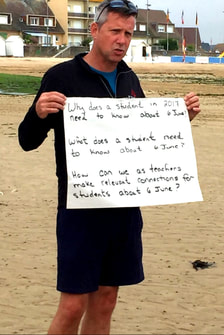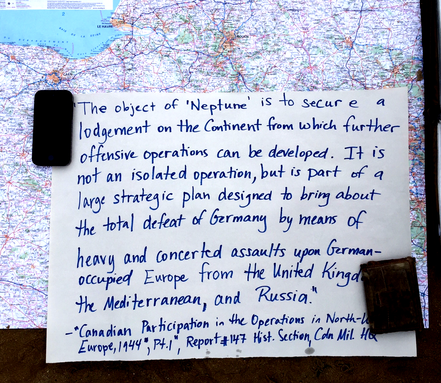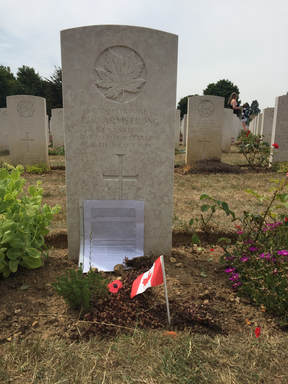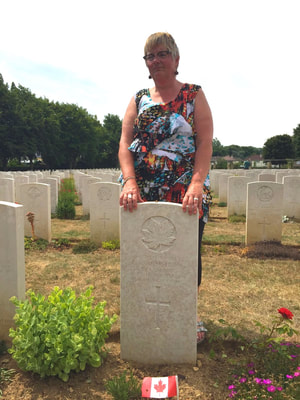"How a teacher responds to a student's response will shift the entire class' response."
Today's Itinerary and Activities
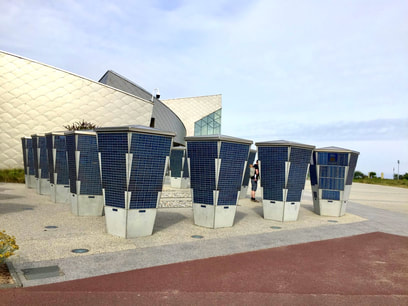 As visitors approach the Juno Beach Centre, they walk past these commemorative plaques
As visitors approach the Juno Beach Centre, they walk past these commemorative plaques
Today we learned about Powerful Questions while inquiring into Canada's experiences on D-Day (6 June 1944). We spent most of our day in Courseulles-sur-Mer, which is where Juno Beach and the Juno Beach Centre are located.
When we arrived at Juno Beach, we formed syndicates to begin an inquiry-based project that involved us formulating responses to a series of Powerful Questions.
We began working on the project immediately. We spent half an hour interrogating Juno Beach. We then drove up the road to the Juno Beach Centre, where we spent an hour viewing the exhibits and investigating the grounds.
Our day continued with a brief stop for coffee in Bénouville, which is where Pegasus Bridge and Café Gondrée are located. Pegasus Bridge, which stretches across the Caen Canal, is significant because British troops successfully captured it early in the morning on D-Day. Café Gondrée is a tourist attraction because the café's building was supposedly the first house to be liberated during the Normandy Campaign.
Our final stop of the day was Ranville War Cemetery where Lorelei presented a biographical sketch of her soldier. After her presentation, we returned to the Moulin Morin. Before we dispersed for the evening, Joel facilitated a seminar that caused us to think critically about Canada's role in D-Day and the Normandy Campaign.
When we arrived at Juno Beach, we formed syndicates to begin an inquiry-based project that involved us formulating responses to a series of Powerful Questions.
We began working on the project immediately. We spent half an hour interrogating Juno Beach. We then drove up the road to the Juno Beach Centre, where we spent an hour viewing the exhibits and investigating the grounds.
Our day continued with a brief stop for coffee in Bénouville, which is where Pegasus Bridge and Café Gondrée are located. Pegasus Bridge, which stretches across the Caen Canal, is significant because British troops successfully captured it early in the morning on D-Day. Café Gondrée is a tourist attraction because the café's building was supposedly the first house to be liberated during the Normandy Campaign.
Our final stop of the day was Ranville War Cemetery where Lorelei presented a biographical sketch of her soldier. After her presentation, we returned to the Moulin Morin. Before we dispersed for the evening, Joel facilitated a seminar that caused us to think critically about Canada's role in D-Day and the Normandy Campaign.
The Power of Powerful QuestionsToday Blake explained that Powerful Questions are open-ended questions that lead to deep thinking, further questions, and discussion. They also foster equal teacher and student voice in the classroom. Powerful Questions sometimes lead to controversy and debates in the classroom, which is excellent. Debates require students to think critically, defend their arguments with evidence, and communicate effectively. These three skills will serve students throughout their lives.
FeedbackBlake drew our attention to the fact that teachers must be conscious of their word choice. He explained that if a teacher acknowledges a few students' responses with phrases such as "Very good" or "Excellent," other students will shift their responses to those that the teacher praised. To prevent students from abandoning their original responses, Blake advised that teachers offer neutral feedback.
|
Inquiry-Based Project: Design an Operational Plan
|
To assist us in understanding and formulating Powerful Questions, Cindy, Blake, and Lee assigned syndicates a two-part inquiry-based project. The first part of the project requires syndicates to respond to three Powerful Questions:
The second part of the project involves syndicates solving the operational plan of Operation Overlord (see image to the right). To complete this task, we must consider different aspects of operations and formulate our own Powerful Questions. Over a two-day period, we will interrogate sites pertinent to D-Day. Our discoveries will enable us to formulate thoughtful responses to the three questions and design an operational plan. |
Road Maps: A Vanishing Resource
While we were exploring Juno Beach, Cindy and Lee drove to a number of shops in an attempt to purchase maps of Normandy for syndicates to use throughout the week; however, they had no luck. They discovered that GPS and Smartphone map applications (e.g. Google Maps) are causing maps to become obsolete.
After we discovered that paper maps are difficult to find, Ronda, who loves maps, reflected on their usefulness:
After we discovered that paper maps are difficult to find, Ronda, who loves maps, reflected on their usefulness:
- Ronda: "I really like maps, I am fascinated by them. Maps allow us to take what we see immediately around us and extrapolate past our view. Through maps we can 'see' past the mountains, around that hill, over the town, we don't have to rely on our sight. We can hypothesize on how people moved from distant areas, what may have impeded their movement, how might areas be connected, or why borders are where they are? These are not easy to answer without maps. It is also sometimes difficult to understand how landscapes and communities have changed over time and maps can help with that. I often use maps (probably more often than my students like!) to show the relationship between different areas or to orient our conversation. Because I really do like maps, I do this almost without thinking and they often get caught up in looking at the map and our initial conversation often veers off into other topics, things that may not have come up had we not been looking at a map. Our use of maps during our site interrogations was particularly helpful because it helped orient us to where we had been and what was happening elsewhere as we discussed the wars."
The Juno Beach Centre
The Juno Beach Centre in Normandy is privately owned and operated by the Juno Beach Centre Association, a Canadian-based not-for-profit organization. The Juno Beach Centre is a centre that educates the public about Canada's role in the Second World War. It also pays homage to Canadians who contributed to the 1939-1945 war effort. Some Association staff work out of Ontario, while others, including student guides, work in Normandy.
After interrogating Juno Beach, we continued our investigation into Canada's experiences during the Normandy Campaign by going through the Juno Beach Centre's exhibit halls and exploring the grounds, which include memorial plaques, a sculpture, concrete fortifications, and a section of Juno Beach.
After interrogating Juno Beach, we continued our investigation into Canada's experiences during the Normandy Campaign by going through the Juno Beach Centre's exhibit halls and exploring the grounds, which include memorial plaques, a sculpture, concrete fortifications, and a section of Juno Beach.
When asked for their impressions of the Juno Beach Centre, Jessica, Lorelei, and Lynzee shared the following thoughts:
- Jessica: "For me, the Juno Beach Centre was personal, as my Grandfather passed away in March. My uncle had a plaque done up for my Grampie years back. To see that was very emotional; I, in all honesty, bypassed the museum for the most part to see the plaque. The museum was content-heavy, which would bore my students. Today was a very emotional day."
- Lorelei: "The Juno Beach Centre has a prescribed, nationalistic narrative. When "shoved" into the museum's opening film room, I felt "caged" and as if I was being fed a story that I was supposed to buy into. It troubles me to think that history is sold as being "sexy." Can we not get beyond ourselves?"
- Lynzee: "I thought that the Juno Beach Centre was informative. I enjoyed the introduction from the soldier's perspective. I found it interesting to incorporate the Aboriginal aspect. There were two displays from my local Aboriginal reservations of Membertou."
Soldier Biography
Lorelei's Soldier
Private Leo Campbell Armstrong
1st Canadian Parachute Battalion, R.C.I.C.
Ranville War Cemetery
Private Leo Campbell Armstrong
1st Canadian Parachute Battalion, R.C.I.C.
Ranville War Cemetery
|
"As I stood on the ridge above Ranville I looked around and was stunned by the beauty. Sadness overwhelmed me because this was the place where Leo landed in the first hours of July 6...What he did was of major significance as the Allies advanced and began the crucial task of liberating France. I have learned that we are all actors in history...and that all we really have is time...Why not make the world and ourselves better while we're here..?"
|
Seminar
Joel facilitated a lively large-group discussion after posing this series of thought-provoking questions:
- What, if anything, did you notice about the topography of Juno that was different from Dieppe?
- Was it important that Canada had its own beach at Juno? Why or why not?
- Is Canada a warrior nation?
- How many French casualties are acceptable to save the rest?
- Can the Canadian troops stop and help the French on the attack?
- What, if any, relevance are the references to MacKenzie King in the Juno Beach Centre? What if anything is relevant about the absence of Borden at Versailles?
- Why do we hear about Sam Hughes but not C.D. Howe?
- Why does the museum end in death and sacrifice divorced from achievement and success?
- Why an Aboriginal Sniper Section of the museum? Were Aboriginals only snipers?
- Is there a “Canadian Voice”? If so, what is it? Can we teach “Canadian Values”? What are they? Have they changed?
Gallery
Where we are |
Contact Us |
